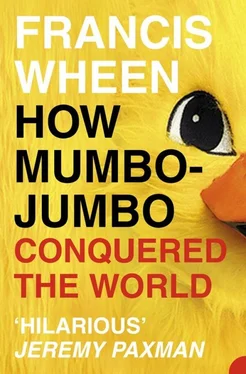If the reader has had the courtesy and patience to accompany me along this path, he may now judge for himself whether, if he cares to lend his aid in making this path into a high-road, it may not be possible to achieve before the end of the present century what many centuries have not been able to accomplish; namely, to secure for human reason complete satisfaction in regard to that with which it has all along so eagerly occupied itself, though hitherto in vain.
From the vantage point of the twenty-first century, it is hard not to smile at the suggestion that the forces of reason might achieve ‘complete satisfaction’, and humanity grow out of its ‘self-incurred immaturity’, some time before 1800. ‘I do not know whether we will ever reach mature adulthood,’ Michel Foucault wrote in the 1980s, reflecting on the 200 years that had passed since Kant’s famous essay for the Berlinischer Monatsschrift . ‘Many things in our experience convince us that the historical event of the Enlightenment did not make us mature adults, and we have not reached that stage yet.’ Foucault himself fiercely opposed the Enlightenment’s universalism yet even he conceded its ‘importance and effectiveness’, arguing that it should ‘be considered not, certainly, as a theory, a doctrine, nor even as a permanent body of knowledge that is accumulating; it has to be conceived as an attitude, an ethos, a philosophical life in which the critique of what we are is at one and the same time the historical analysis of the limits that are imposed on us and an experiment with the possibility of going beyond them.’
Just so: the Enlightenment was not so much an ideology as an attitude – a presumption that certain truths about mankind, society and the natural world could be perceived, whether through deduction or observation, and that the discovery of these truths would transform the quality of life. The foundations on which it built were those laid by the empirical philosophers and natural scientists of the seventeenth century – most notably Francis Bacon (1561–1626), John Locke (1632–1704) and Isaac Newton (1642–1727) – and the debt was fully acknowledged: Thomas Jefferson described them as the ‘greatest men that have ever lived, without any exception’, while d’Alembert and Diderot dedicated their Encyclopédie , that great monument of the French Enlightenment, to the trinity of English patron saints. (Rather less credit was given to Spinoza, the seventeenth-century Dutch philosopher who is only now beginning to receive his due. A recent study by Jonathan Israel presents him as the architect of the Radical Enlightenment –‘the chief challenger of the fundamentals of revealed religion, received ideas, tradition, morality and what was everywhere regarded, in absolutist and non-absolutist states alike, as divinely constituted political authority’.)
According to d’Alembert, ‘once the foundation of a revolution has been laid down, it is almost always in the next generation that the revolution is accomplished’. The eighteenth century had no scientific advances comparable with those of Newton and Galileo, but the philosophes were standing on the shoulders of giants – and could therefore see further. ‘By separating theology from natural philosophy, or by ingeniously arguing that natural philosophy supported theology, seventeenth-century scientists concealed from themselves, as much as from others, the revolutionary implications of their work,’ the historian Peter Gay writes. ‘Geniuses from Galileo to Newton lived comfortably with convictions that eighteenth-century philosophes would stigmatise as incompatible … For Newton, God was active in the universe, occasionally correcting the irregularities of the solar system. The Newtonian heavens proclaimed God’s glory.’ The achievement of the eighteenth century was to detach Newton’s God from his physics, teasing out the implications of discoveries from the age of genius and pushing them to their logical conclusion: the professed aim of the Scottish philosopher David Hume was to be ‘the Newton of the moral sciences’. As one modern commentator has said, the originality of the Enlightenment:
lies not so much in what was preached as in the fervour of the preacher and the beneficial effects expected of the sermon. What distinguished the Enlightenment above all was its determination to subject all received opinions to the test of reason, to apply this test especially to views on human behaviour, to ethical and political theory, and to extract from the knowledge thus won whatever could be useful in improving the human lot.
Of course there were many different Enlightenments, each with its distinctive style, and scholars still argue about which was the real torch-bearer. Local particularities had a strong influence: in Germany and Scandinavia, characteristically, progressive thinkers sought to enlighten absolutist monarchs and create a modern, efficient polity; the French philosophes were more preoccupied with challenging aristocratic feudalism and the Roman Catholic church; in Britain, where a settlement of sorts had already been reached with both clerisy and monarchy, more attention was paid to the nature of liberal capitalism. Any movement which traced its ancestry to both Cartesian rationalism and Lockean empiricism could never be homogeneous. The Enlightenment encompassed optimists and pessimists, deists and atheists, democrats and elitists, Voltaire and Rousseau.
Despite their quarrelsome diversity, however, most Enlightenment thinkers shared certain intellectual traits – an insistence on intellectual autonomy, a rejection of tradition and authority as the infallible sources of truth, a loathing for bigotry and persecution, a commitment to free inquiry, a belief that (in Francis Bacon’s words) knowledge is indeed power. That phrase is sometimes used by Machiavellian politicians to justify the restriction of valuable information, but for the philosophes it was a slogan of emancipation, a declaration of war against the impotence of ignorance. ‘Enlightenment’ had two meanings, both evident in the Encyclopédie : the discovery of truth and its subsequent diffusion. The purpose of the Encyclopédie , Diderot said, was to ‘change the general way of thinking’; and it succeeded. The Enlightenment had many critics, but its illuminating influence and achievements were apparent in the history of the next two centuries – the waning of absolutism and superstition, the rise of secular democracy, the understanding of the natural world, the transformation of historical and scientific study, the new political resonance of notions such as ‘progress’, ‘rights’ and ‘freedom’.
Does that light still shine today? If you type ‘The Enlightenment’ into a search engine at the online retailer Amazon, more than 1,500 books are listed. Look more closely, however, and you’ll notice that many of them have nothing in common with what Kant, or indeed Foucault, meant by Enlightenment: The Power of Now: A Guide to Spiritual Enlightenment; The Secrets of Kung Fu for Self Defence, Health and Enlightenment; Crystal Enlightenment: The Transforming Properties of Crystals and Healing Stones; The Rosicrucian Enlightenment; The Tibetan Art Colouring Book: A Joyful Path to Right Brain Enlightenment; Awakening the Buddha Within: Eight Steps to Enlightenment; and Golf for Enlightenment: Playing the Game in the Garden of Eden , a recent title from the entrepreneurial mystic Deepak Chopra. ‘The Enlightenment made explicit what had long been implicit in the intellectual life of Europe: the belief that rational inquiry leads to objective truth,’ the British philosopher Roger Scruton wrote in 1999. ‘Even those Enlightenment thinkers who distrusted reason, like Hume, and those who tried to circumscribe its powers, like Kant, never relinquished their confidence in rational argument … For the ensuing 200 years, reason retained its position as the arbiter of truth and the foundation of objective knowledge. [But] reason is now on the retreat, both as an ideal and as a reality.’
Читать дальше












